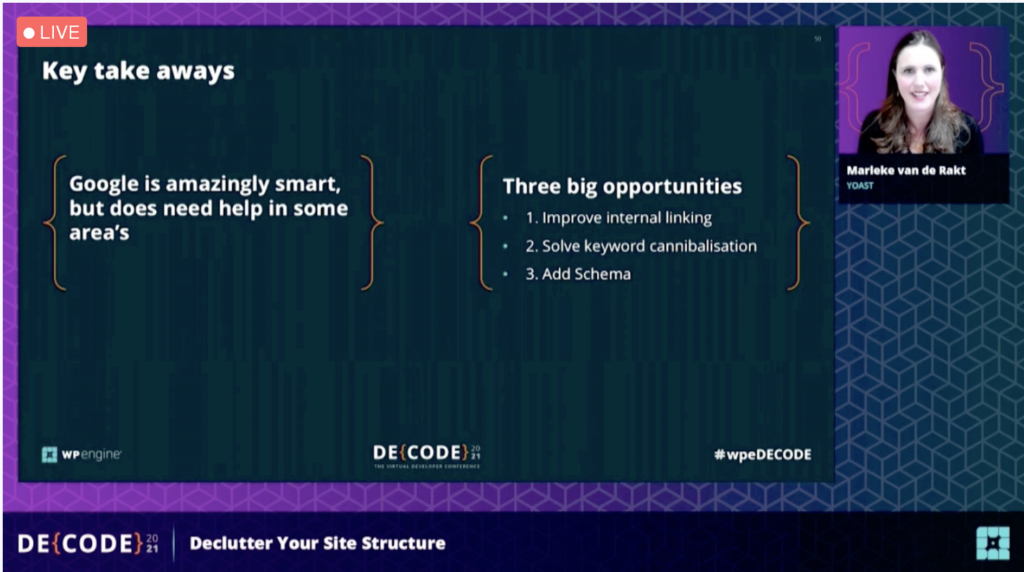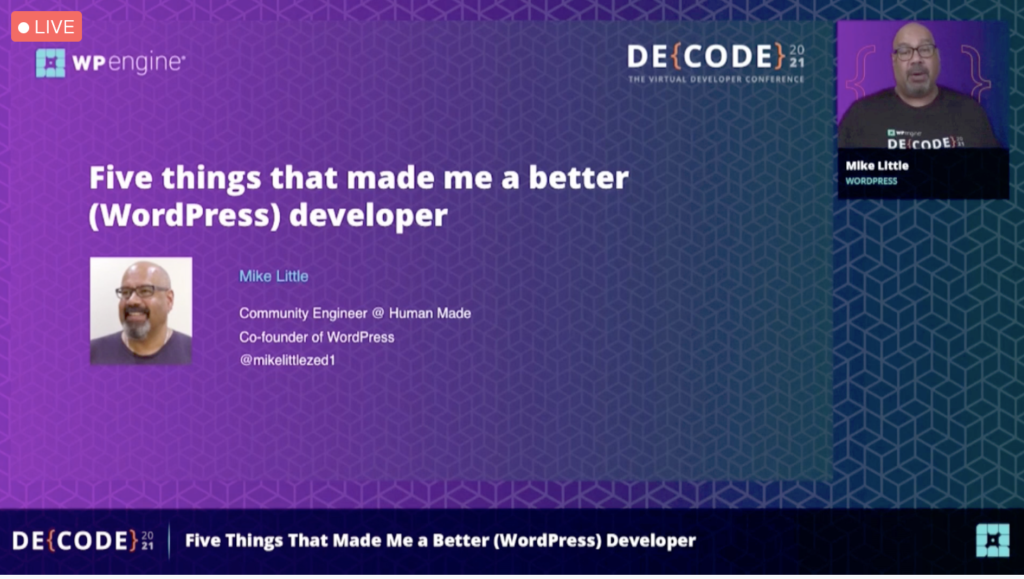WP Engine’s developer-focused conference DE{CODE} just wrapped up for the second year in a row. The virtual conference acted as a way to bring together people from around the community and learn.
The day consisted of three keynotes and a variety of shorter breakout sessions that focused on the life cycle of a website: Set up, Build, Launch, and Optimize.
On top of talks, attendees could attend networking sessions as well as chat in the Slack channel.
Each talk focused on how to make your site more powerful and reach more people.
Headless WordPress
The first keynote, delivered by WP Engine founder and CTO, Jason Cohen, looked to the future of Headless WordPress. While many people think decoupled architecture is a far-off idea, Cohen said that 64 percent of enterprise companies are already using it.
“The whole point of a decoupled architecture is realizing maybe we shouldn’t use one tool for every job, but the best tool,” Cohen said. “Websites can be up to 10 times faster when built this way than when WP is rendering every page.”
Headless gives developers the chance to to have more freedom and access new frameworks. It also allows for more personalization and omni-channel experiences.
While all this freedom is exciting, it can be overwhelming. To make headless even more accessible, Cohen announced WP Engine’s latest product offering, Atlas. Atlas manages all of the vendors needed to make a Headless WordPress work, as well as offer support when necessary.
Atlas allows developers to let someone else worry about making sure all the pieces work and focus on making beautiful and creative websites.
Get Noticed Faster
The next keynote called “Declutter Your Site Structure,” and was delivered by Yoast CEO Marieke van de Rakt. Yoast has led the charge in SEO for WordPress so van de Rakt is the perfect person to help get your website noticed by Google.
You may think that just by getting green on your SEO information you are doing all you can to get recognized by Google, but if you’re missing site structure you’re losing visitors.
While Google is excellent at understanding words and context but unless you help it, it can’t figure out which information is the most important. That is why you need schema.
Every site needs hierarchy. Van de Rakt walked through how important it is to write many articles that cover the main topic you want to highlight from different perspectives. The most important part here is to make sure they all link back to each other.
If your site has been around a long time you might unknowingly be hitting the same keywords too hard. If you have two articles with the same keywords, Google won’t know which one is more important.
By addressing just a few issues with your site structure, you can rank higher.

Be a Better Developer
The third keynote was helmed by none other than WordPress co-creator Mike Little. The talk looked into tools to become a more successful and flexible developer.

We all know Little co-created WordPress, but he is no stranger to various other coding languages. Taking the time to really dig into different languages gives a developer more flexibility.
Once you know which language to move forward in, it’s important to think really deeply about what exactly you’re building.
“Figure out what inputs and outputs you want, create an automated test to see if those are functioning and write code to make sure they do. Once they are working how you want, the site is done,” Little said. “Define what it is you’re supposed to be building and you’ll build something that does what is required and nothing more.”
In the same vein, Little urged developers to expand their horizons. “It can be easy to fall into a rut but when new things come along they can show what the client wants or what the market requires,” he said. “They may seem like passing trends but a lot of them stick around so make sure you have a large range of projects you work on.”
The next big piece is to consider accessibility across the board. Think about someone holding a child with one hand and accessing your site with another. Think about someone who needs text-to-voice or someone who needs to get something quickly from your site and move on. Accessibility is a big term and unless you are considering multiple possibilities you could be missing a lot of customers.
Finally, Little spoke about the importance of remaining humble.
“No matter how good you get, everything changes, and you have to grow with it. Always be ready to learn,” Little said. It isn’t about knowing more or having more experience or being better than you, other people know other things than you. We can learn from anyone.”
40 Percent and Beyond
Topics covered a wide-range of topics but one thing was ever-present, the power of WordPress. Looking back on an incredibly rough year, WordPress and the community prevailed.
The CMS takes a bigger chunk of the web every year and it’s all due to the strength and creativity of the people who work tirelessly to make it better. Here’s to another incredible year!

No Comments